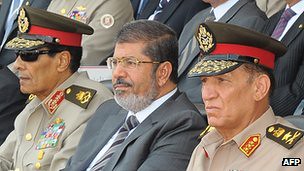
Dr. Mohamed Morsi, the president of Egypt, seating alongside top Egyptian military officials, Field Marshal Tantawi on his right and Chief Gen. Sami Enan. The two political forces are adjusting to the outcome of the national elections., a photo by Pan-African News Wire File Photos on Flickr.
Morsy orders ‘freedom’ for 572 detained by the military Egypt’s ex-spy chief died of rare disease
CAIRO, July 20, (Agencies): Egyptian President Mohamed Morsy on Thursday ordered the release of 572 people detained by the military, the official MENA news agency reported.
Morsy, who was sworn in last month as Egypt’s first elected civilian president, “issued an order to pardon 572 people convicted by the military justice,” MENA said.
The Egyptian president had ordered the formation of a committee to review the cases of civilians tried by the military.
A total of 11,879 Egyptians have been detained by the military since last year’s uprising that toppled Hosni Mubarak, according to figures issued by the committee.
Of these, 9,714 have since been released.
Activists and international rights groups have repeatedly called for the end of military trials of civilians.
“International law is crystal-clear on this: no civilian, regardless of the crime, should be tried by a military court,” Sarah Leah Whitson, Middle East and North Africa director at Human Rights Watch, said this week.
She urged Morsy to take a “principled human rights stance and pardon all civilians convicted by military tribunals.”
Morsy was sworn in on June 30, taking over from a military council which oversaw the transition from Mubarak’s rule.
But the president has been locked in a power struggle with the Supreme Council of the Armed Forces which issued a constitutional declaration — that acts as a temporary charter— giving the military sweeping powers.
“Military trials and arrests of civilians by the military have continued despite the June 30 handover to civilian authority,” Human Rights Watch said.
The committee formed by Morsy does not however have the mandate to look into cases of military trials and arrests of civilians after the the handover date.
Military trials have been criticised for not meeting the requirements of independence and impartiality.
Meanwhile, Egypt’s former intelligence chief Omar Suleiman died from a rare disease affecting the heart and kidneys, according to the US clinic where he was undergoing medical tests at the time.
Suleiman, who died at age 76 on Thursday, was fallen Egyptian president Hosni Mubarak’s last deputy and one of his most trusted advisers. He stepped briefly into the limelight when he was made vice president days before Mubarak was ousted in a popular uprising last year.
“On Thursday, July 19, General Omar Suleiman ... passed away due to complications from amyloidosis, a disease that affects multiple organs including the heart and kidneys,” the Cleveland Clinic said in a statement issued on Thursday night.
It said Suleiman had checked into the clinic on Monday and the disease was discovered after her underwent multiple tests.
Preparations were under way to bring Suleiman’s body home for burial. Suleiman will be accorded a military funeral in Egypt on Saturday, the state newspaper al-Ahram said.
Suleiman is to receive a military funeral in Cairo on Saturday, the official MENA news agency reported.
“General Omar Suleiman, former vice president, will receive a military funeral after prayers at the Al-Rashdan mosque,” in Cairo, MENA said.
Suleiman died on Thursday of a heart attack aged 77. He had been undergoing medical tests in the United States.
A private plane carrying his body is expected to arrive in Cairo overnight, his personal aide, General Hussein Kamal told MENA.
The former general had reportedly suffered from lung disease for several months, after which he developed heart problems.
Suleiman was appointed vice president during the last days of the uprising against Hosni Mubarak’s regime in a bid to placate protesters.
Less than two weeks later, on February 11, 2011, he would give a brief television address to announce Mubarak’s resignation.
Suleiman left Egypt after a failed bid to run in the country’s first ever presidential polls in May.
The winner of that election, former Muslim Brotherhood official Mohamed Morsy, sent his condolences to Suleiman’s family, his spokesman Yassir Ali said on Thursday.
For almost two decades, Suleiman ran the feared and powerful General Intelligence Service, wielding immense power that was used to crush dissent, particularly from the
Muslim Brotherhood and other Islamist groups.
He was well respected in the United States, with whom he partnered to orchestrate a series of short-lived truces between Israel and the Palestinians.
No comments:
Post a Comment